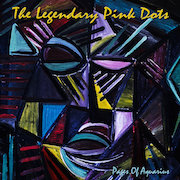The problem with the Age of Aquarius is that nobody seems to know when it’s due, or indeed whether or not it’s already begun. According to the song ‘Aquarius’ from hippy musical Hair, the dawning will come when "The moon is in the seventh house, and Jupiter aligns with Mars." Unfortunately, as astrologer Neil Spencer has noted, the moon enters the seventh house daily, while Jupiter and Mars are aligned several times a year. Other astrologers have argued for Aquarian start dates ranging from 1447 right up until 3597.
In the popular imagination, however, the Age of Aquarius will always be associated with the “love generation” counter-culture of the 1960s, and represents the utopian new age that their flower power shenanigans were supposed to usher in. In other words, it should be here by now, and it manifestly isn’t. As Legendary Pink Dots’ mainstay Edward Ka-Spel notes, if this is Aquarius page one then love, peace and good hair are hardly qualities in the ascendant. "It wasn’t supposed to be like this," he writes. "Are we in for another 2,160 years of this?"
Ultimately though, Ka-Spel’s conclusions are optimistic. What we’re actually living through are the death throes of the Pisces Age, he argues; it’s brutal and painful, but it won’t last. The way to get through is by letting go, on both a personal and societal level, and in order to do this we need to look unflinchingly at where we are now, what is holding us back and what will help us move forward.
So the album’s opening track, ‘Mirror, Mirror’ tackles introspection, narcissism and self-loathing alongside the hard but necessary task of looking closely at your own self and putting the work in to improve. Stinging synthesiser blasts reflect this flinching process over driving electronic percussion, before a melancholy mellotron passage suggests a degree of sorrowful self-acceptance has been found. On ‘The Greatest Story Ever Told,’ a swarm of buzzing clockwork wasps soundtrack rising existential dread before the song shifts into a litany of reasons not to worship God, or indeed watch his movies on TV, all set to a queasy rendition of ‘All Things Bright and Beautiful.’ The Age of Pisces is often identified as the Christian era, and early Christians identified themselves using two fishes as a symbol; among other qualities, Aquarius is associated with the decline of religion and the rise of technology. "We worship technology," Ka-Spel whispers ambivalently at the close.
How the glorious analogue squelching of ‘D-Train’ fits into the concept I’m not sure, but ‘Credibility’ and ‘Trending’ take a look at the world around us, the former cursing "Damn your eyes, austerity" over lullaby-like piano, while the latter looks at the mysterious force of the zeitgeist as represented by popular topics on social media. Watching "the great sea ripple," Ka-Spel wonders who or what is driving the trends, directing our thoughts and attention as one linked collective organism.
The album concludes with two multi-part epics. The near-eighteen minute ‘Don’t Go There- Page Aquarian- Jacob’s Ladder’ begins in haunting yet propulsive style, discussing surveillance culture and "cameras everywhere" before shifting onto memory as a form of observation, returning to the theme of looking unsparingly at your own past actions and how they’ve led you to where you are now. A collage of found sound leads into a passage of spare percussion over which Ka-Spel considers the stars and the notion of destiny, before the final section finds tentative piano chords reverberating over the sound of a gathering storm. Here considerations of mortality and the afterlife are resolved into the need to make peace and find some kind of acceptance.
For CD listeners, that’s where the album ends, but it would be a shame to miss out on the sixteen-and-a-half minute ‘The Weight of Water Parts 1-4,’ which is only available on digital and double vinyl editions. A dry, steady pulse beat supports slabs of musique concrete and some non-judgemental meditations on self-destructive behaviour, before a frantic flurry of low piano notes in a repeating, claustrophobic loop successfully simulates a panic attack. This then shifts into an oceanic evocation of waking at 3am with the realisation that your life has been wasted in deceit and acquisitiveness, before the instrumental final section captures a zen-like sensation of beatific release, with acoustic and electronic textures beautifully balanced against each other.
Aquarius of course is the water bearer, and ‘The Weight of Water’ effectively sums up the pain and difficulty of this period of transition. There’s no need though to take the astrological metaphors literally; this album can be enjoyed purely as an unsettling and moving 83 minutes of music, and for those who do listen closely to the words, Ka-Spel’s dry sense of humour undercuts any tendency towards new age pretentiousness.
Their long history could make some wrongly see the Legendary Pink Dots as unapproachable or worse, irrelevant. But Pages of Aquarius is an album that stands on its own merits. Even if you’ve never bought a Pink Dots record before, this is a progressive, provocative and ultimately positive statement about the world we’re all living in today.


